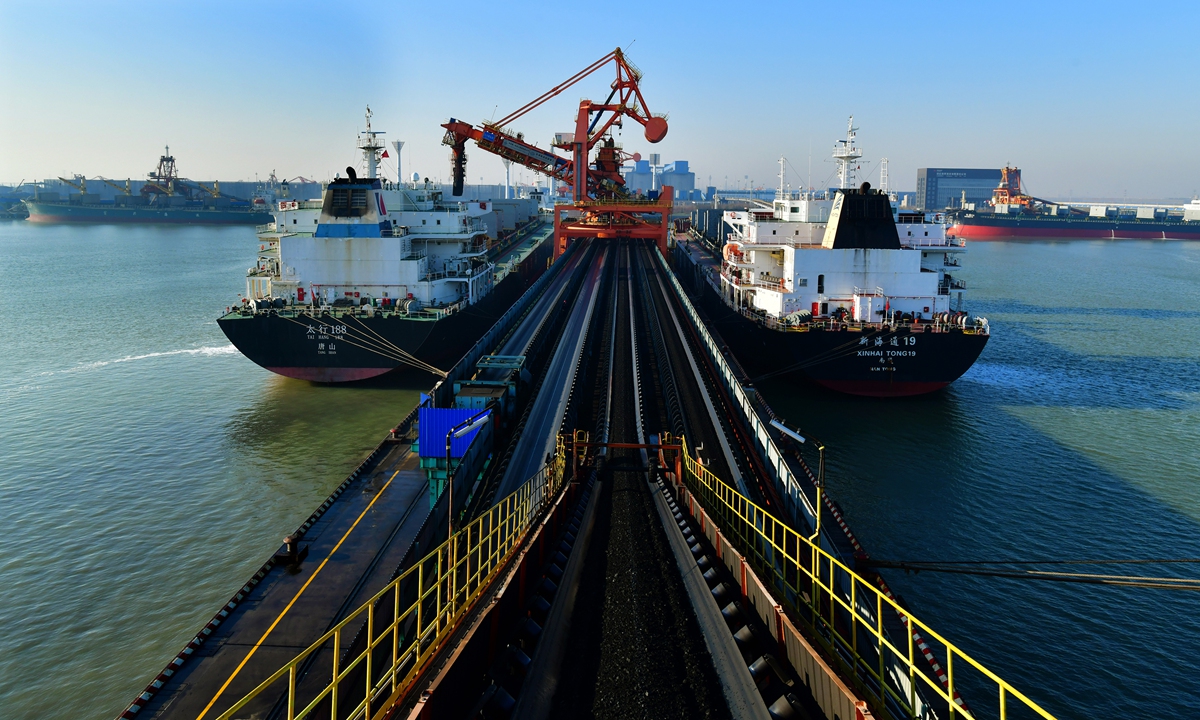China's coal supply stretched as economy rapidly recovers
Nation ensures energy security despite soaring risks in global market

A vessel docks at Huanghua port, North China's Hebei Province to load coal in December 2021. Photo: cnsphoto
With the Chinese economy witnessing a quick recovery after the recent Omicron flare-up is controlled and the society's electricity consumption ramps up, energy demand is surging. Experts and industry players said that the overall energy situation is safe as the country has accelerated efforts to secure supplies despite global uncertainties.
Coke producers in Shandong, Shanxi and Hebei provinces raised the price of coke by 100 yuan ($15) per ton on Tuesday, initiating a new round of price rises for metallurgical coal.
Shares of related companies rose by about 1.2 percent on Thursday, with Zhengzhou Coal & Electric Co and JXIC Anyuan Coal Industry Group hitting the daily limit. The sector has on average gained about 30 percent since April 26.
"As the epidemic has been brought under control, coal demand on the market has rapidly resumed," a marketing representative of a coal processing company based in East China's Anhui Province told the Global Times on Thursday.
The latest price rise is deemed a "correction" of the market, the representative said.
Ukrainian President Volodymyr Zelensky said on Tuesday that his country planned to suspend natural gas and coal exports to give priority to domestic energy supply, since Ukraine may face "the most difficult winter," according to media reports.
Indonesia, the world's largest coal exporter imposed a one-month export ban on thermal coal on January 1. Though the ban has been lifted, market observers believe export restrictions may return.
The price of Newcastle coal futures stood at $395.4 per ton on Thursday. The price was only about $150 at the start of the year, according to data tracking platform Trading Economics.
"We import about 200,000 tons of coke every year. If the prices in the international market stay high, we will turn to domestic suppliers after our inventory is used up," a marketing representative said, stressing that domestic supply would be sufficient given coal producers have been expanding their production capacity.
China has been ramping up efforts to ensure domestic energy supplies. In April, the nation announced plans to increase coal production capacity by 300 million tons this year, as energy will provide primary support for China's economic and social development.
Enterprises above the designated size in Northwest China's Xinjiang Uygur Autonomous Region produced 119.7 million tons of coal from January to April, up 29 percent year-on-year, regional data showed.
Different departments have been preparing to stabilize the energy market. State Grid Corp of China, which supplies electricity to over 1.1 billion people across the country, has geared up for the summer peak consumption season.
During a recent meeting, the company vowed to implement 30 key steps to ensure power supply, including strengthening the maintenance of ultra-high voltage transmission lines.
China Railway delivered 110 million tons of thermal coal in May, up 7 percent year-on-year.
"The overall energy supply this year won't be a big problem," Lin Boqiang, director of the China Center for Energy Economics Research at Xiamen University, told the Global Times on Thursday.
Compared with last year when factories saw surging overseas orders, industrial power consumption is lower this year. Also, relevant authorities have rolled out measures to ensure power supplies after shortages happened in some provinces last year, including stabilizing coal prices, Lin said.
But challenges remain as the supply-demand balance for coal will remain tight, and prices are expected to stay high, given surging prices in overseas markets. Also, domestic production capacity expansion takes time, he added.
